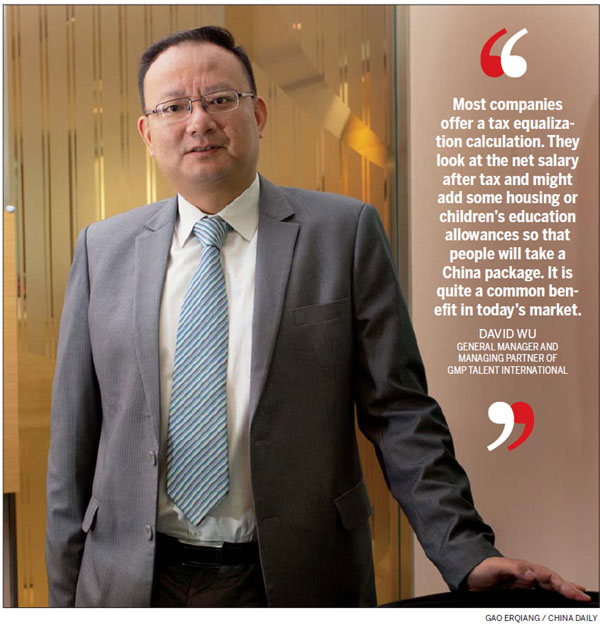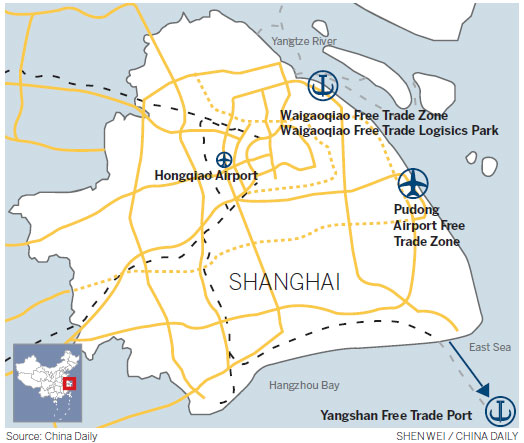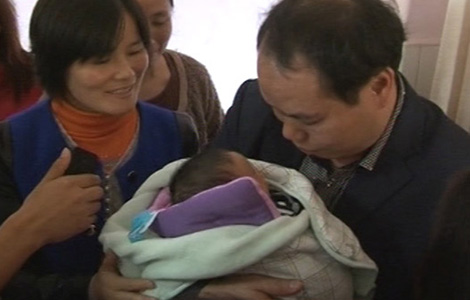Launch zone
Updated: 2013-11-08 09:14
By Andrew Moody (China Daily Europe)
|
|||||||||||
May Yan, banking analyst for Barclays Capital in Hong Kong, says it is far easier to place a border around a zone where goods are manufactured than one that applies to services and, in particular, the movement of money.
"You can actually control physical goods. There is only so much you can actually smuggle but finance is just numbers in a computer that can be switched very quickly. The wiring of money is so easy."
The "general plan" for the zone states the convertibility under the capital account will be introduced gradually through a series of trial programs as will market-orientated interest rates.


He Weiwen, co-director of the China-US/EU Study Center at the China Association of International Trade in Beijing, says the authorities are being understandably cautious.
"In the broad master plan of the free trade zone the wording referred to the full convertibility of the yuan. In the State Council's notice this wording was removed because it might be too early to say that. However, the currency will have to be convertible on capital account, or the free trade zone will have no meaning," he says.
Simon Gleave, regional head of financial services for KPMG Asia-Pacific, based in Beijing, says the problem for the authorities is that they are attempting something completely new.
"No country has tried to open up and deregulate at this stage of its development and when it is of the scale that China is now. It is already the world's second-largest economy so to try and create a convertible currency in one go is a very big ask and a very big unknown in terms of the effect it might have," he says.
"The implications for the rest of the world of getting it wrong are quite important. That is why it is important to use some sort of pilot area which is already in the center of China's capital markets."
One of the aims of the planners is to make the FTZ attractive to multinationals and the hope is that a number of them will make the zone their Asia headquarters. Many multinationals now do the majority of their Asia business in the Chinese mainland but have their base in Singapore or Hong Kong. This involves a lot of unnecessary travel for many senior executives visiting their operations in the world's second-largest economy.
The reason why they do this is because under the current currency conversion rules they would not be able to transfer money between their various Asia locations and their headquarters, if it was in China.
If these currency restrictions were removed, it would make no difference if the headquarters was in the FTZ, Singapore or elsewhere. Money could flow freely in and out of the zone. The problem of getting money out of the rest of China would remain for the zone-based company but it would be at no disadvantage to a company based elsewhere in Asia.
He at the China-US/EU Study Center at the China Association of International Trade believes it is not clear yet whether multinationals will move to the zone.
"Most companies have their manufacturing or research and development base. To have a regional headquarters in China, you need to be able to do international settlements. This is a step in the right direction but it is too early to say."
Some have argued that regional CEOs would be put off moving to the mainland because of higher tax rates compared with Singapore or Hong Kong, particularly on their own personal remuneration packages.
In his office in 21st Century Tower in Pudong, David Wu, general manager and managing partner of GMP Talent International, doubts whether that would be a deterrent.
He recruits executives from 600,000 yuan (72,800 euros, $98,000) a year to some on 3 million yuan.
"Most companies offer a tax equalization calculation. They look at the het salary after tax and might add some housing or children's education allowances so that people will take a China package. It is quite a common benefit in today's market," he says.
As well as multinationals, the FTZ could be an ideal location for Chinese companies looking to expand their international activities.
Kevin Chen, principal of international management consultants AT Kearney, speaking from his office in Hang Seng Tower in the Pudong New Area, says many are now at the stage at which the FTZ would be a useful platform.
"At the beginning many Chinese companies had just one investment in a foreign country which was just about doable with having an existing base in China and the current currency restrictions," he says.
"We have advised one company that has an existing German operation but is now looking to add another in Brazil. It really needs the ability to move money around globally and being located in the free trade zone could be the solution for this."
Chen says the zone is not just proving attractive to these larger globally ambitious companies but also entrepreneurs who think something good might come. "There are a number of entrepreneurs from Zhejiang and Jiangsu (two provinces that are known throughout China for their entrepreneurs) who are registering in the zone. They don't know what is going to happen there but they think it might be an opportunity to make money."
Mark Purdy, chief economist and managing director of economic research for management consultants Accenture, who was visiting his company's Shanghai Central Plaza offices, believes the FTZ might even prove to be a China Silicon Valley.
"If it works, you will get thesenetwork effects of bringing in and encouraging some hopefully highly innovative private sector companies. So you can create a mini Silicon Valley."
Because businesses in the medical sector are allowed to set up in the zone, there has even been speculation that foreign-owned hospitals will sprout up on the green areas around the existing warehouses. If not hospitals, the zone could be an unlikely center for cosmetic surgery and other specialist procedures.
Today's Top News
SOE reforms to be launched after plenum
'Singles Day' to see big spenders
Launch zone challenges
European satellite continues fall to Earth
CPC session begins to set reform agenda
Economic growth to continue
Super typhoon kills over 10,000
World powers, Iran to hold news nuclear talks
Hot Topics
Lunar probe , China growth forecasts, Emission rules get tougher, China seen through 'colored lens', International board,
Editor's Picks

|

|

|

|

|

|





